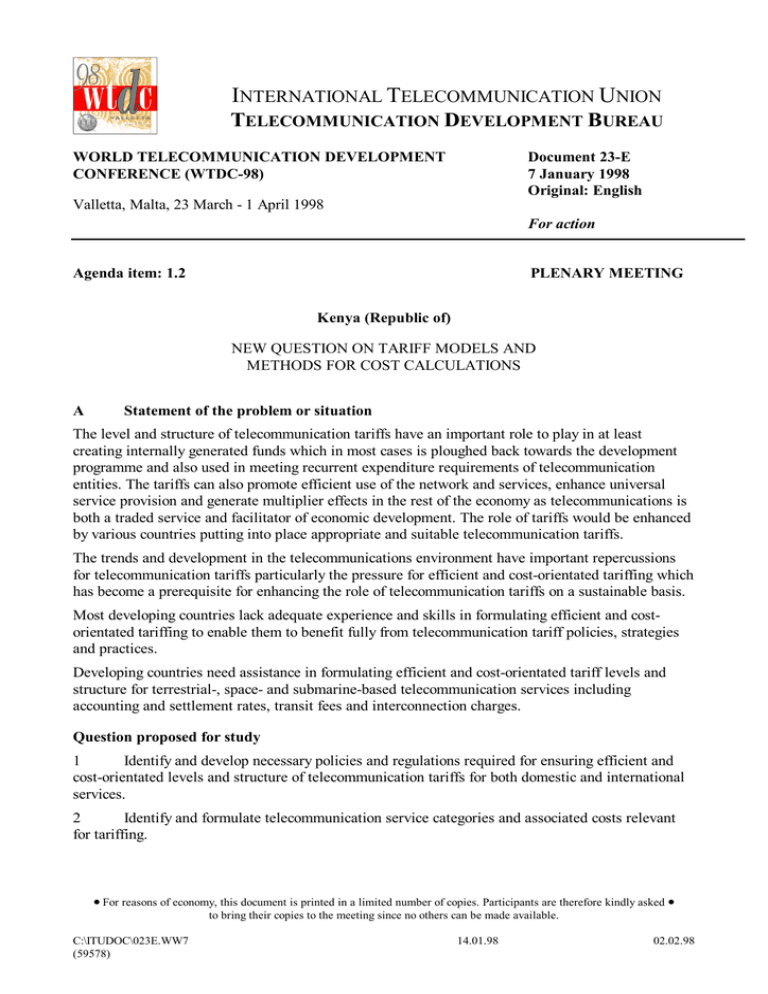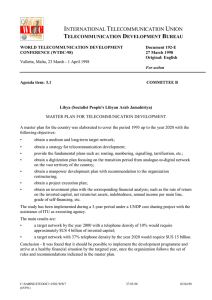I T U D
advertisement

I NTERNATIONAL TELECOMMUNICATION UNION TELECOMMUNICATION DEVELOPMENT BUREAU Document 23-E 7 January 1998 Original: English WORLD TELECOMMUNICATION DEVELOPMENT CONFERENCE (WTDC-98) Valletta, Malta, 23 March - 1 April 1998 For action Agenda item: 1.2 PLENARY MEETING Kenya (Republic of) NEW QUESTION ON TARIFF MODELS AND METHODS FOR COST CALCULATIONS A Statement of the problem or situation The level and structure of telecommunication tariffs have an important role to play in at least creating internally generated funds which in most cases is ploughed back towards the development programme and also used in meeting recurrent expenditure requirements of telecommunication entities. The tariffs can also promote efficient use of the network and services, enhance universal service provision and generate multiplier effects in the rest of the economy as telecommunications is both a traded service and facilitator of economic development. The role of tariffs would be enhanced by various countries putting into place appropriate and suitable telecommunication tariffs. The trends and development in the telecommunications environment have important repercussions for telecommunication tariffs particularly the pressure for efficient and cost-orientated tariffing which has become a prerequisite for enhancing the role of telecommunication tariffs on a sustainable basis. Most developing countries lack adequate experience and skills in formulating efficient and costorientated tariffing to enable them to benefit fully from telecommunication tariff policies, strategies and practices. Developing countries need assistance in formulating efficient and cost-orientated tariff levels and structure for terrestrial-, space- and submarine-based telecommunication services including accounting and settlement rates, transit fees and interconnection charges. Question proposed for study 1 Identify and develop necessary policies and regulations required for ensuring efficient and cost-orientated levels and structure of telecommunication tariffs for both domestic and international services. 2 Identify and formulate telecommunication service categories and associated costs relevant for tariffing. •For reasons of economy, this document is printed in a limited number of copies. Participants are therefore kindly asked • to bring their copies to the meeting since no others can be made available. C:\ITUDOC\023E.WW7 (59578) 14.01.98 02.02.98 -2CMDT98/23-E 3 Identify, collate and/or develop suitable costing and tariffing models and methodologies for applying efficient and cost-orientated telecommunication tariffing in developing countries and ensuring the provision of universal services. 4 Prepare appropriate guidelines and recommendations for possible use by developing countries in implementing efficient and cost-orientated tariffing of various telecommunication services. B Expected output 1 Policy and regulation document on efficient and cost-orientated tariffing of telecommunication services in developing countries. 2 Guidelines and recommendations on efficiency and costing considerations for formulating levels and structure of telecommunication tariffs in developing countries. 3 Tariffing and costing models for use in formulating efficient and cost-orientated telecommunication tariff levels and structure in developing countries. 4 Comparative tariffing and costing models for a developed country and a developing country. Required timing of the expected output End 1999. Proposers/sponsors of the question or issue Kenya. Sources of inputs required in carrying out the study – Member States. – Sector Members. – Regional Organizations. – ITU Sectors. Target audience for the output Developed countries Developing countries LDCs Telecom policy makers * * * Telecom regulators * * * Service providers (operators) * * * Manufacturers * * * The output will be particularly useful for service providers, telecom regulators and telecom policy makers. The implementation of the results should be through a number of channels including information dissemination, seminars, workshops, conferences, etc. Proposed method of handling the proposed question – Expert group within BDT activities. _____________ C:\ITUDOC\023E.WW7 (59578) 14.01.98 02.02.98
